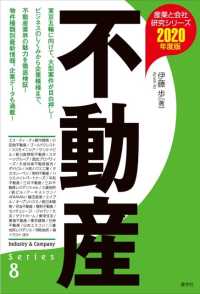- ホーム
- > 洋書
- > 英文書
- > History / World
基本説明
This book explores the ways in which fictional narratives were used to explore tensions between the individual and the dominant culture attendant on the rise of Christianity, and the displacement of Greeks from the hegemonic position in the Roman empire.
Full Description
Through the close study of texts, Roman Imperial Identities in the Early Christian Era examines the overlapping emphases and themes of two cosmopolitan and multiethnic cultural identities emerging in the early centuries CE - a trans-empire alliance of the Elite and the "Christians." Exploring the cultural representations of these social identities, Judith Perkins shows that they converge around an array of shared themes: violence, the body, prisons, courts, and time.
Locating Christian representations within their historical context and in dialogue with other contemporary representations, it asks why do Christian representations share certain emphases? To what do they respond, and to whom might they appeal? For example, does the increasing Christian emphasis on a fully material human resurrection in the early centuries, respond to the evolution of a harsher and more status based judicial system?
Judith Perkins argues that Christians were so successful in suppressing their social identity as inhabitants of the Roman Empire, that historical documents and testimony have been sequestered as "Christian" rather than recognized as evidence for the social dynamics enacted during the period, Her discussion offers a stimulating survey of interest to students of ancient narrative, cultural studies and gender.
Contents
1. Cosmopolitan Identities 2. False Deaths and new Bodies 3. Constructing a Patriarchal Elite 4. Resurrection and Judicial Bodies 5. Place, Space and Voice 6. Trimalchio: Transformations and Possibilities 7. Reurrection and Social Perspectives 8. The Rhetoric of the Mternal Body 9. Competing Chronologies






